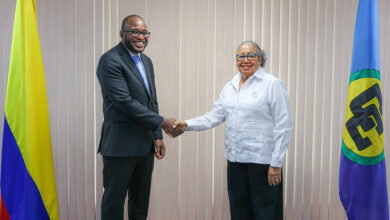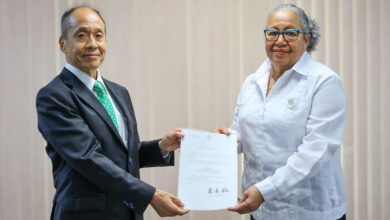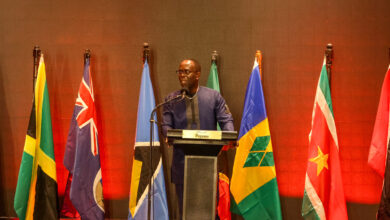The Sixth Meeting of the Regional Task Force on Crime and Security of the Caribbean Community (CARICOM) was held in Port-of-Spain, Trinidad and Tobago from October 30 to November 01, 2002.
It was presided over by Mr. Lancelot Selman, Chairman of the Regional Task Force on Crime and Security for the Caribbean Community.
In attendance at the Meeting were the following countries and regional institutions: Antigua and Barbuda, Barbados, Belize, British Virgin Islands, Grenada, Guyana, Jamaica, St. Kitts and Nevis and Trinidad and Tobago. Regional Organizations represented were: Association of Caribbean Commissioners of Police (ACCP), Caribbean Customs Law Enforcement Council (CCLEC), Caribbean Financial Action Task Force (CFATF), CARICOM Secretariat and United Nations Control Programme (UNDCP).
OPENING REMARKS
In his opening remarks Mr. Lancelot Selman, Chairman welcomed the delegates and noted the presence of British Virgin Islands, the newest member of the Task Force and Mr. Overand Padmore, Advisor to the Prime Minister of Trinidad and Tobago on regional security matters. The Chairman reported that the CARICOM Heads of Government at their Meeting in July 2002, Guyana, endorsed the Task Force Report and requested that particular attention be paid by the Task Force to mechanisms for implementing the agreed priorities which include:
(i) Establishment of broad-based National Commissions on Law and Order;
(ii) Strengthening the Information and Intelligence Exchange Regime as an essential element in the fight against illegal drugs, firearms and terrorism;
(iii) Establishment of the Regional Mutual Legal Assistance Regime and preparation of a Regional Exchange of Prisoners Agreement.
The CARICOM Heads of Government decided that the life of the Task Force be extended for a further year to July 2003 and further recommended the addition of two issues to be addressed:
(i) Development of a regional program to address youth violence
(ii) Engagement of the international community in discussions on the current policy on illicit drugs in the Region.
The Coordinator of the Regional Coordinating Mechanism for CARICOM, Colonel Fairbairn Liverpool, updated the meeting on recent initiatives on the area of demand reduction for drugs. These initiatives would require additional support from and co-operation with the international community. Several thematic priorities were outlined for demand reduction of drugs in the regional strategy including:
(i) Surveillance, Research and Development/Evaluation
(ii) Prevention and Education
(iii) Treatment and Rehabilitation.
In his intervention to the opening session, Dr. Edward Greene, Assistant Secretary General for Human and Social Development, CARICOM, emphasized how the work of the Task Force intersects with the wider social and economic programs of the Community, in particular, it's interaction with the Council for Human and Social Development (COHSOD).
He extended appreciation to Mr. Lancelot Selman for his effective leadership of the Task Force and to the Government of Trinidad and Tobago whose Prime Minister has responsibility for the Regional Portfolio for Drugs and Security, for agreeing to finance the local cost of the Task Force for another year.
Dr. Greene further noted that COHSOD VII endorsed the priorities for the follow-up action by the Task Force and recommended that urgent consideration be given to the establishment of multi-sectoral commissions for crime and drugs at the regional and national levels that include both supply and demand aspects.
The Meeting accepted the offer of the Crime Unit at U.W.I. St. Augustine to provide technical assistance to accelerate the development of respective National Commissions.
The Meeting agreed that models like those in St. Lucia and Barbados can be adopted by other countries.
AIM OF MEETING
Implementing priorities
The main aims of the Sixth Meeting of the Task Force were stated as to identify projects and program activities, mechanisms for their implementation as well as other regional priorities that should be included in a medium/long term strategy framework for reducing crime and threats to the security of the Region.
UPDATE ON THE WORK OF THE TASK FORCE
The Meeting was given an update on the work of the Task Force. In this respect, the Meeting was advised that the Chair of the Task Force met with representatives of a number of regional and international organizations including the Inter-American Drug Abuse Commission (CICAD), the European Union, Council for Human and Social Development (COHSOD), U.W.I. Non-governmental Organization (NGOs), United Kingdom Government, and national stakeholders, to elicit support for its work.
The priorities, as outlined by the Task Force, for the coming year include:
– Examination of the recommendations in the report with a view to implementation;
– Examining items in the original mandate that were not addressed.
– Engaging the regional publics and international partners and organizations in its efforts to implement the recommendations in the report.
RECENT EXPERIENCES OF MEMBER STATES
Trinidad and Tobago, Jamaica, St. Kitts and Nevis, Guyana, Belize, Grenada, British Virgin Islands and Barbados updated the Meeting on counter crime activities undertaken over the past year. The reports reflected many similarities in crime trends. Most member countries were experiencing similar problems such as an increase in youth crime, drug related activities and crimes involving illegal firearms. Some countries indicated an unprecedented upsurge in criminal activities in the past eight months. Jamaica reported on co-operation with Colombia, which has facilitated major seizures in drugs and cash.
Trinidad and Tobago reported an increase in crime especially victimless crimes, for example, suicide, and drug-related crimes. In response to the upsurge in crime, the Government had implemented a National Anti-drug master plan and enhanced the Rapid Response Unit of the Police Service, and also enacted a Proceeds of Crime Act to counter the money laundering activity associated with drug trafficking. In addition, the responsibilities of the Ministry of National Security were increased by the inclusion of rehabilitation to its portfolio.
REVIEW OF EXISTING POLICY ON ILLICIT DRUGS
In accordance with the mandate of the CARICOM Heads at their last Meeting in July, 2002, the Task Force agreed that there was need for a review of the Region's counter-drug policies given the limited success in the reduction of supply and demand. The Task Force further agreed that there was need for in-depth research, utilizing empirical data and evidence-based analyses, to assist in the development of appropriate and effective policies and strategic plans and to facilitate law reform.
SOUTH-SOUTH CO-OPERATION
A presentation was made by U.N.D.C.P. concerning the possible initiative for co-operation between the Caribbean and Southern Africa. The view was expressed that the experience of the developed world and not that of the developing countries have dominated the debate on crime prevention. As a result of this, a major flaw in the debate has been a lack of shared experiences amongst Third World countries. Emphasis was placed on establishing mechanisms to share these experiences in order that regions may learn from each other. The Task Force supported the proposal for research for best practice for crime prevention in the Region.
Standardization of Crime Statistical Reporting in the Region
The Task Force endorsed a proposal for standardization of reporting of statistical data on crime in the region having regard to different criteria observed to be used. This observation was supported by a study conducted in Barbados. In this respect, the Task Force agreed to pursue the initiative of standardization in conjunction with UNDCP, with special consideration to the training of social statisticians to make the process more efficient.
REGIONAL INITIATIVES
It was also agreed that taking into account the Heads of Government priorities, a medium term implementation plan must be drawn up with immediate effect to establish the following:
– Research into the causes of crime
– Criminal Intelligence
– Criminal Records
– Forensic Service
– Regional Fingerprint Database
– National Crime Commission and Master Plans
– Regional Demand Reduction Strategy
– Standardization of Regional Statistics
– Establishment of Policy and Research Unit
– The exchange of best practices in areas such Kidnapping
– Research on the routes, trends, use and social and economic import of illegal firearms
EMERGING TRENDS IN CRIMINAL ACTIVITIES
Domestic Violence
Special attention was given to reports concerning the prevalence of domestic violence across the region. In this respect, most Governments have already enacted legislation to address the problem. The increase in the reports of domestic violence has caused Police Departments across the region to form Special Response Units to address the problem.
The need for government agencies and Civil Society to provide education, counseling and rehabilitation has been identified as essential tools to assist in minimizing the problem.
Crimes against Tourists
Tourism is of paramount importance to the economies of the Region and as such the repression of crime in the industry is a primary focus of the Police. This however often requires the diversion of critical resources especially manpower from the wider communities. It was noted however, that notwithstanding the high cost associated with the control of crime against tourists, the Caribbean enjoys a relatively low rate of this type of crime as against the wider international community.
STATUS OF BORDER CONTROL SECURITY IN THE REGION
The Meeting, in considering the status of Border Control Security -in the region, received presentations by Member States on initiatives being undertaken to strengthen border security. It also noted the comprehensive measures of the Canadian and U.S. Authorities in their joint Border Security Measures, which were presented at the Regular Session of the OAS/CICAD held in Washington in May 2002. It was agreed that the Region could learn from these experiences. In light of the pursuit of the Region's Single Market and Economy which would involve free movement of people, goods and services, the Task Force proposed that a workshop be convened on regional co-operation in border control security measures.
MONEY LAUNDERING
The progress of actions in the region against the threat of money laundering and terrorist financing was also discussed during the Regional Task Force Meeting.
Most of the countries in the region have been quite successful in introducing adequate anti-money laundering legal frameworks. However this is an ongoing process that will be continuously guided and supported by the Caribbean Financial Action Task Force.
Two CARICOM Member States area still on the FATF Non Co-operative Country list, but are expected to be removed from this list at the next FATF Plenary scheduled to be held early 2003. The Region has shown commitment to combating the threat of money laundering and terrorist financing and is determined to continue in this pursuit.
CONCLUSION
The Crime and Security Task Force reiterates its commitment to pursue the implementation of recommendations aimed at reducing the levels of crime and illegal drugs in the Region. The Task Force is also committed to developing and implementing medium and long term strategies based on research and empirical data, to assist in the implementation of Regional and National Policies, Strategic Plans and to facilitate Law Reform. It is the goal of the Task Force that through the collaborative effort of Member States and the International Community the reduction of crime and illicit drugs would render an improved state of security in the Region.
The Meeting urged that Regional Governments and the International Community should provide more support to combating crime, drugs and threats to security.
1 November, 2002





